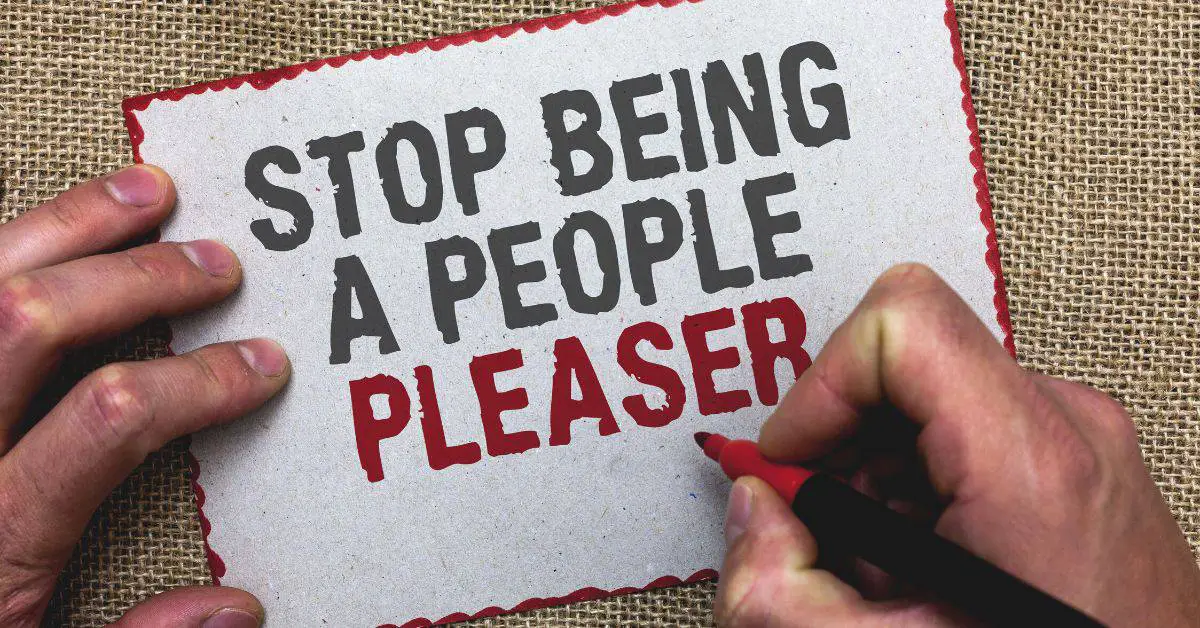4 Effective Strategies To Not Become A People Pleaser
Being a people pleaser can be quite detrimental to one’s sense of self-worth and well-being. People pleasers often strive to make others happy at the expense of their own needs and desires, sacrificing their autonomy for the sake of not disappointing or upsetting those around them.
This fear-driven behavior can lead to feelings of inadequacy, powerlessness, and an inability to form meaningful relationships with others. To break free from this cycle, it is important to take action toward regaining confidence, joy, and control in one’s life.
This could involve setting boundaries with close friends and family members, taking time out for yourself each day and engaging in activities that bring you joy, learning how to communicate your feelings more effectively, and understanding how to accept constructive criticism without being overly critical of yourself.
With enough self-love and practice, you can learn how to build a healthier relationship with yourself and others.
Here’s how to stop being a people pleaser:

1. Consider Pausing Before Responding To A Request.
People pleasers often struggle with difficulty in saying no. They may reflexively agree to requests without considering their personal boundaries or schedules, as they don’t want to disappoint others.
To help break this habit, it’s important to take some time to reflect upon a favor before agreeing to do it. A great way to do this is by responding with “Let me check my schedule and get back to you”.
This phrase gives people pleasers an opportunity to think about the request and make sure they have the capacity and energy for it before committing.
In addition, it also provides them with a way of politely declining if they find that the favor doesn’t work with their current lifestyle.
Ultimately, being honest with ourselves and others is key to sustaining our mental health and well-being.
2. Don’t Let Guilt Force You To Become A People Pleaser.
When facing a request from a colleague to take over a project, we should ask ourselves why we are tempted to say yes.
It could be that we genuinely want to help our friend or it may be because we have a feeling of guilt if we turn them down.
While guilt can sometimes lead us to do the right thing, such as calling our parents, it is important to recognize when it is leading us into an unsustainable and negative situation.
If our motivation for agreeing is rooted in guilt, self-care dictates that it would be best for us to politely decline the request and look after our own well-being.
In doing so, we respect both our mental health as well as the boundaries of our relationship with that co-worker.
Being honest with each other and setting appropriate expectations within working relationships can ultimately create healthier dynamics between colleagues and prevent us from being overextended when taking on projects.
WISELIVN DAILY
Make your inbox healthier and happier with the latest WiseLivn Media stories, delivered fresh daily. Will be used in accordance with our Privacy Policy.
3. Overcome Your Anxiety Of People Being Upset.
Fear can limit us from taking beneficial actions for ourselves, like making time for important self-care. Many of us have a tendency to fear the worst, often imagining dire consequences like our spouse leaving us or our friends no longer admiring us if we put our own needs first.
This type of worry is almost always unfounded – in fact, it’s likely that your loved ones will not only be understanding but also supportive if you make the effort to prioritize yourself.
It may take some time for those around you to adjust to seeing a more assertive version of yourself, but those who truly care about you won’t abandon you because you’re being more mindful of your needs.
Taking a bit of extra time for yourself can help boost your self-esteem and encourage healthy habits; furthermore, it can also serve as an example to those around you that taking care of oneself should be an integral part of life.
4. Take Baby Steps To Fight Off The People-Pleasing Habits.
We all understand the importance of taking care of ourselves, yet it can be difficult to ask for and accept what we need.
To help build up our strength in this area, setting a reminder on our phones to take a daily 15-minute break is one way to make sure we are prioritizing our well-being.
Additionally, setting aside time each weekend for meditation may be beneficial and allow us to relax and recharge.
To ensure that we have enough time to accomplish all of our tasks, it is important to review our workloads each week.
This will provide an accurate assessment of how much time is needed for each task, and will also help us set realistic boundaries when unexpected obligations arise.
Self-reflection around these areas can lead us toward building more autonomy and self-assurance as we learn how to create boundaries that protect our mental and physical health.

